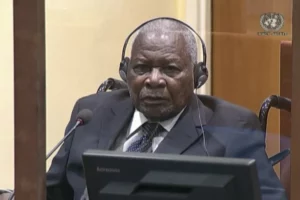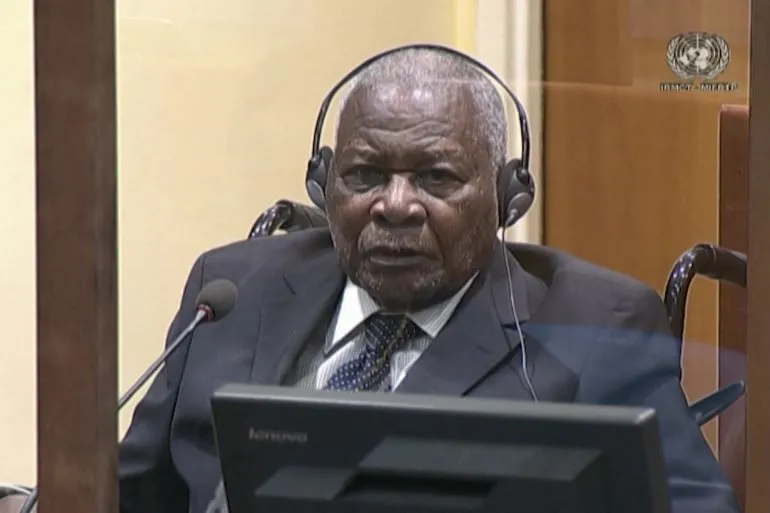Felicien Kabuga’s trial has been suspended, which is upsetting and distressing, but it does not lessen the significance of his arrest in the quest for justice for the victims and survivors of the 1994 Tutsi Genocide. That’s Serge Brammertz’s belief as chief prosecutor for the UN Residual Mechanism for Criminal Tribunals.

Dr. Brammertz emphasized in an interview with Kigali Today that even while he didn’t agree with the court’s ruling, he still understood and respected it.
It is said that Kabuga played a significant role in the homicidal regime of former President Juvenal Habyarimana. Being one of the wealthiest businessmen in Rwanda at the time, he was the owner of the hate radio station RTLM (Radio Television Libre des Mille Collines), which served as the mouthpiece for the genocide’s architects and perpetrators.
Kabuga, along with other genocide planners and offenders, fled after the Rwanda Patriotic Front (RPF) ultimately defeated the genocidal forces in July 1994. His wealth and dishonest government officials, who would hide his location for money and even give him fake passports, worked together to enable him to avoid international arrest orders for more than 20 years.
Living in Asnieres-Sur-Seine, on the suburbs of Paris, justice eventually caught up with him in 2020 through the International Mechanism for Criminal Tribunals (IRMCT). His 26-year-long game of cat and mouse with international justice had come to an end.
Brammertz, who feels that justice is best served in the same jurisdiction where crimes are committed, wanted to try Kabuga at least in Arusha if he could not have him tried in Rwanda. However, Kabuga’s defense team was successful in arguing that the 87-year-old’s health was too fragile for him to travel, so the trial was held in The Hague, Netherlands.
Initially, it was cardiac issues, but his defense quickly claimed he had dementia, making it impossible for him to continue with the trial. Medical experts concurred with the defence, despite the prosecution’s disagreement, and the judges were convinced to put the trial on indefinite hold.
Brammertz was disappointed and frustrated by the judges’ decision, especially since his crew had been searching for him. After the court’s ruling, he started a whistleblower tour to express his gratitude to the various organizations in the several nations he had collaborated with to prosecute Kabuga.
The prosecution filed an appeal against the trial’s suspension, arguing that Kabuga was more than capable of following the court’s orders. According to Brammertz, the prosecution believed that Kabuga’s “intellectual capabilities were sufficient to follow a trial,” which is why they wanted the trial to continue. It is a perspective that one of the judges agreed with.
“I humbly disagree with the prevailing view that Kabuga is not competent to face trial. “I consider that Kabuga has not demonstrated his unfitness to stand trial and that such unfitness is not supported by the medical evidence on the record,” Judge Mustafa El Baaj stated in his ruling. Conversely, he said, “I am confident that Kabuga still possesses a number of abilities that enable him to meet the legal standards outlined in our body of precedent.”
However, the majority position won out, and Kabuga will now be free—albeit with a lot of restrictions—much to the dismay of the people who survived the serious crimes he was accused of, which are unlikely to result in a conviction.
Many have criticized international justice in light of the Kabuga trial’s suspension, particularly in relation to the Rwandan genocide against the Tutsi people. They conclude that there are, at the very least, certain double standards—one set of rules for the West and another for Africa—after drawing a comparison between the prosecution of former Nazis and the Holocaust against the Jewish people seventy years later. Almost all of the accused former Nazis plead ill health; the oldest is 101 years old, and many are in their 90s. Despite this, the proceedings are never stopped.
It is an idea that Brammertz disapproves of. The International Criminal Tribunal for Rwanda (ICTR) had a large number of African judges and attorneys, and the trials were heard there. He contends that “African justice delivered by Africans” has occurred. The survivors are nonetheless shocked by the trial’s halt, though.
The prosecution proposed the so-called trial of the facts, a seldom utilized legal alternative that was also rejected, owing as much to respect for the victims’ feelings as for the survivors’. There would have been a judgment that would have allowed a conclusion to be reached, but the procedure would not have resulted in a conviction.
“The benefit, according to Brammertz, is that the trial would have gone on, the trial judges would have heard all the evidence, and they would have concluded with findings and conclusions about the crimes committed, taking into account the victims’ and survivors’ status as victims and survivors”.
Kabuga’s trial may be renewed in theory at a later time, but there is very little chance that this will happen—not least because his attorneys would keep arguing that he is incapable of following the court’s procedures. The possibility that he won’t set foot in a courtroom again seems more realistic.
Brammertz believes that even though the trial has been suspended, Kabuga’s arrest is still crucial for international justice. The IRMCT is now concentrating on other cases, including the one involving Fulgence Kayishema, who was apprehended in South Africa recently, as well as the roughly 100 additional instances in which the accused are still at large.
Brammertz begs for increased help from nations so that he can carry out his work, as the arrest of Kabuga required laborious work and difficult cooperation.
More than 1,200 fugitives are out there, and Kabuga’s predicament clearly demonstrates how the odds are stacked against us. Since many of these individuals are becoming older and the longer it takes for justice to be served, the more countries we need to support us in our efforts to apprehend more fugitives and genocidaires.The pursuit of justice must go on, and we’ll keep working with Kigali’s prosecutor general as well as our other colleagues and partners to ensure that further fugitives are apprehended.
“I am sending a clear message to all capitals because, as we know, half of the 1,200 fugitives are in Africa, with the remaining individuals being in Europe, the United States, Canada, and Australia. We are telling all of these countries that they have a legal and moral obligation to extradite those individuals to Rwanda so that they can face charges.” It is your responsibility to prosecute those people in your own jurisdictions if, for any reason, you are unable or unwilling to extradite them.
“As a residual mechanism of the United Nations and a former ICTR, we have over a million pages of documents pertaining to the genocide against the Tutsi in Rwanda, and we are more than willing to assist any country in prosecuting those responsible for genocide.” Thus, the battle will continue, more procedures are ahead of us, and we are prepared to assist Kigali and other nations in pursuing the outstanding cases.
But for Kabuga, the matter was almost resolved. Under normal conditions, he would now be sent back to his native country—Rwanda, in this case—the only nation legally required to accept him. Although it is unlikely to occur, that is an eventuality that his lawyers will contest. It is now anticipated that his defense team would search for a third nation that will accept him on humanitarian grounds.
Even while Brammertz sympathizes with the survivors’ sadness and dissatisfaction, he still thinks that Kabuga’s arrest was a big deal, and the way the trial concluded does not change that. He personally felt that the trial could and should have gone on, and he completely agreed with the opposing judge. Regarding Kabuga, he states, “I have been of the opinion from day one that his trial can go on and must go on; he was fit enough to be a fugitive for so many years, and he was living in a small apartment in Paris.”
“Having reviewed every medical report the judges had, I felt he was competent enough to handle the proceedings.particularly since he has extremely capable legal representation from a lawyer who was unquestionably qualified to provide him with the required legal assistance…I have a strong personal opinion on the matter, but as a prosecutor in a court of law, you are forced to abide by the rulings of the judges. That is the distinction between those of us enforcing humanitarian law and the genocidaires who carry out their atrocities in violation of all applicable laws.Therefore, even though I disagree, I have to accept the appeals judges’ final verdict because I can clearly see their reasoning.
Even though Kabuga has strong connections and is well-protected, he was unable to avoid arrest, which is an unsatisfactory conclusion to a protracted, challenging, and expensive case. Despite this, the IRMCT can take solace in the knowledge that international justice has been served, even though it may not have gone as they had hoped.
